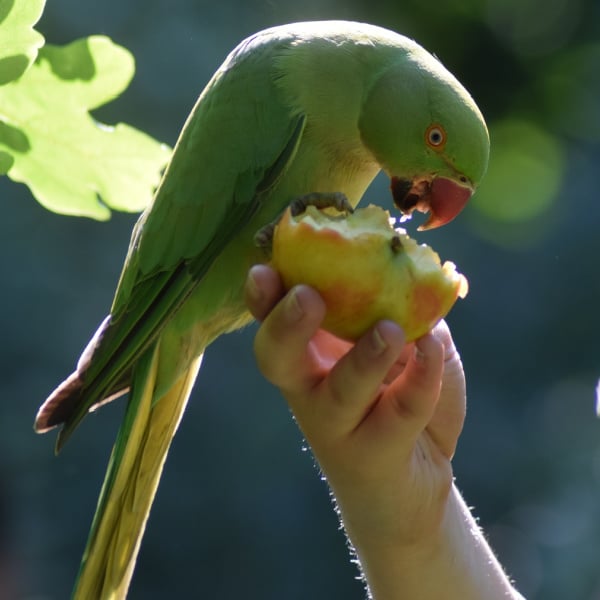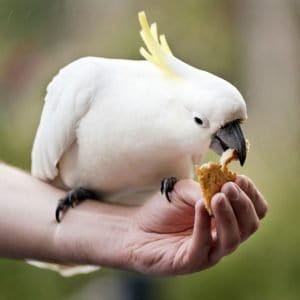Last Updated on by Mitch Rezman
I’m not sure when we started selling TOP’s Parrot Food formally known as Totally Organics.
The distraction of moving to Indiana allowed us to move a little away from focusing on “the devil’s in the details”.
We noticed the packaging had changed as well as the titles of the food but did not really drill down into this bird food line until recently.
For years we had known Gudrun Maybaumand (who had been running Totally Organics since 2003) with her team, then “Gary” from TOP’s reached out to us.
Catherine began a thread with Gary that lead to expanding our offering of TOP’s organic bird and parrot food.
We also learned of a major rebranding effort made by TOP’s Parrot Food Co-owners Gary Rubin and Kristen Ertischek which they began in early 2018 after purchasing the company.
They launched two major initiatives one was to update their packaging.
[Best_Wordpress_Gallery id=”24″ gal_title=”Tops”]
Over the past year, they have added 14 new SKUs to make this bird food line more well-rounded.
But wait there’s more!
The company earned its USDA Organic certification in 2018.
Gary is proud to explain that they don’t use fillers like peanuts, soy or corn, or any artificial flavors, colors, or sugar.
Gary and Kristen are hard at work to proselytize the virtue of pet bird food that uses no soybeans.
Why no soybeans?
“Soybeans in their natural state contain large quantities of natural toxins and there is data that soy is cumulatively toxic when fed to animals.”
For example, The PARROT SOCIETY NEW ZEALAND claims that soy products in bird food have caused such problems as immune system breakdown, failure of organs and multiplication of the birds’ own benign bacteria”.
TOP’s pellet line has also expanded to include large, small, and mini sizes, made with all organic ingredients from the United States.
We really like their new “bundles” here’s a look at a new TOP’s bundle.
Your birds will enjoy All in One Seed mix which can be served as “fresh” after 8 hours of soaking.
If you haven’t heard of TOP’s or Totally Organics or if you just haven’t let your bird feast on this incredibly healthy bird food take a fresh look at this exciting revamped line.
We offer Higgins organic millet but it’s certified organic – – in France.
I’ll have to drill down on French organic regulations someday.
We are familiar with Harrison’s which is the only certified organic and non-GMO bird food we offer.
Aside from Harrison’s Birdie bread, you’ll find Harrison’s High Potency and Adult Lifetime both of which are pellets.
TOP’s organic bird food offers a seed mix that can be served dry or soaked as well as organic bird treats.
We’re certainly not anti-pellets but as we like to remind people there are no pellet trees in the rain forest.
To those that say “seeds are bad for birds” and “seeds will kill your bird”, I like to bring your attention to the fact that budgies and grass parakeets (as in parakeets that live off grass seeds) have been living fine on this planet without human intervention and pellets for oh about 50 or 100 million years.
Pellets do have their place in pet bird care.
If you ask Mark Hagen, the developer of HARI bird food he will tell you.
“The cost of feeding a bird is not based on the price per kilogram of food but the price per kilo-calorie of digestible energy.
Extruded foods are able to incorporate more efficient fat levels into the texture of the “kibble”.
Higher digestibility and slightly higher energy values are the trends in producing a very economical diet with excellent health maintenance”.
If you’re looking for the best of both worlds start by baking some TOP’s birdie bread in a muffin tin while adding crushed TOP’s pellets to the mix.
Introduce the muffins to the bottom of the cage away from any poop trajectories and break them up.
The birds can’t resist the muffins but won’t be able to avoid the crushed pellets.
After a week or two offer only the crushed pellets along with some whole pellets even if they are the mini size and see how well they are accepted.
You can also try ordering a TOP’s pellet and seed bundle.
Keep bowl season pellets in birdcage feeder dishes throughout the day.
Just before birdie bedtime when the lights go out to remove the seeds from the cage.
When your bird gets the night munchies the only thing available will be the pellets which can help make the transition easier.
If you have special circumstances that you’d like to discuss feel free to reach out and will do the best we can to provide a high-quality nutritional program for your bird.
Editor’s note: Ask any avian veterinarian about soybeans and birds.
They will tell you they can be detrimental to senior birds and are considered one of many plucking triggers. Endnote.
From one of our customer’s human:
Hi Mitch, just saying “thanks” for all the advice and tips I have taken from our Sunday mornings together.
My 13-year-old rescued Quaker, Olliebird, is a happier, busier, healthier bird, thanks to you.
He now has a light over his cage, eats some green stuff, following your frozen veggie-in-the- food processor idea.
He is still picky but hey, progress!
My question is about pellets.
I checked your site for TOPs Parrot Food pellets for small hookbills.
Olliebird refuses all pellets.
I have bought so many recommended ones, several from you I believe, but he will not eat them.
This company (TOP’s) was kind enough to send me a sample bag for him to try and he WENT for them!
He ate every last one!
I have been feeding this pellet to him daily along with the few veggies he will eat, all-in-one organic seed mix from TOP’s, pumpkin seeds as treats and a little pasta.
Am I on track to get and keep him healthy?
He is a plucker.
I am trying to correct this behavior.
If you have any more wisdom to impart on this problem we would be very appreciative.
Sorry, I tend to ramble.
Thanks,
Linda
Hi Linda,
Let’s see how soybean free food impacts his plucking.
Plucking can be triggered by countless means.
We stopped using this form as providing answers became too time-consuming due to the volume of responses but we have found the questions may offer insights to feather destruction triggers you may not have considered.
If you have additional questions feel free to reach out.
Written by Mitch Rezman
Approved by Catherine Tobsing
Author Profile
Latest entries
 Feeding Exotic BirdsDecember 29, 2025How to Switch or Convert Your Bird From Seeds to Pellets: Real-Life Case Studies and Practical Guidance
Feeding Exotic BirdsDecember 29, 2025How to Switch or Convert Your Bird From Seeds to Pellets: Real-Life Case Studies and Practical Guidance Feeding Exotic BirdsDecember 16, 2025A Practical, Budget-Smart Guide to Feeding Birds Well
Feeding Exotic BirdsDecember 16, 2025A Practical, Budget-Smart Guide to Feeding Birds Well Bird EnviornmentsDecember 7, 2025Understanding Budgie Cage Bar Orientation: Myths, Realities & Practical Solutions for Vertical-Bar Bird Cages
Bird EnviornmentsDecember 7, 2025Understanding Budgie Cage Bar Orientation: Myths, Realities & Practical Solutions for Vertical-Bar Bird Cages Feeding Exotic BirdsDecember 5, 2025How Dr. T.J. Lafeber Rewrote the Future of Pet Bird Nutrition
Feeding Exotic BirdsDecember 5, 2025How Dr. T.J. Lafeber Rewrote the Future of Pet Bird Nutrition



